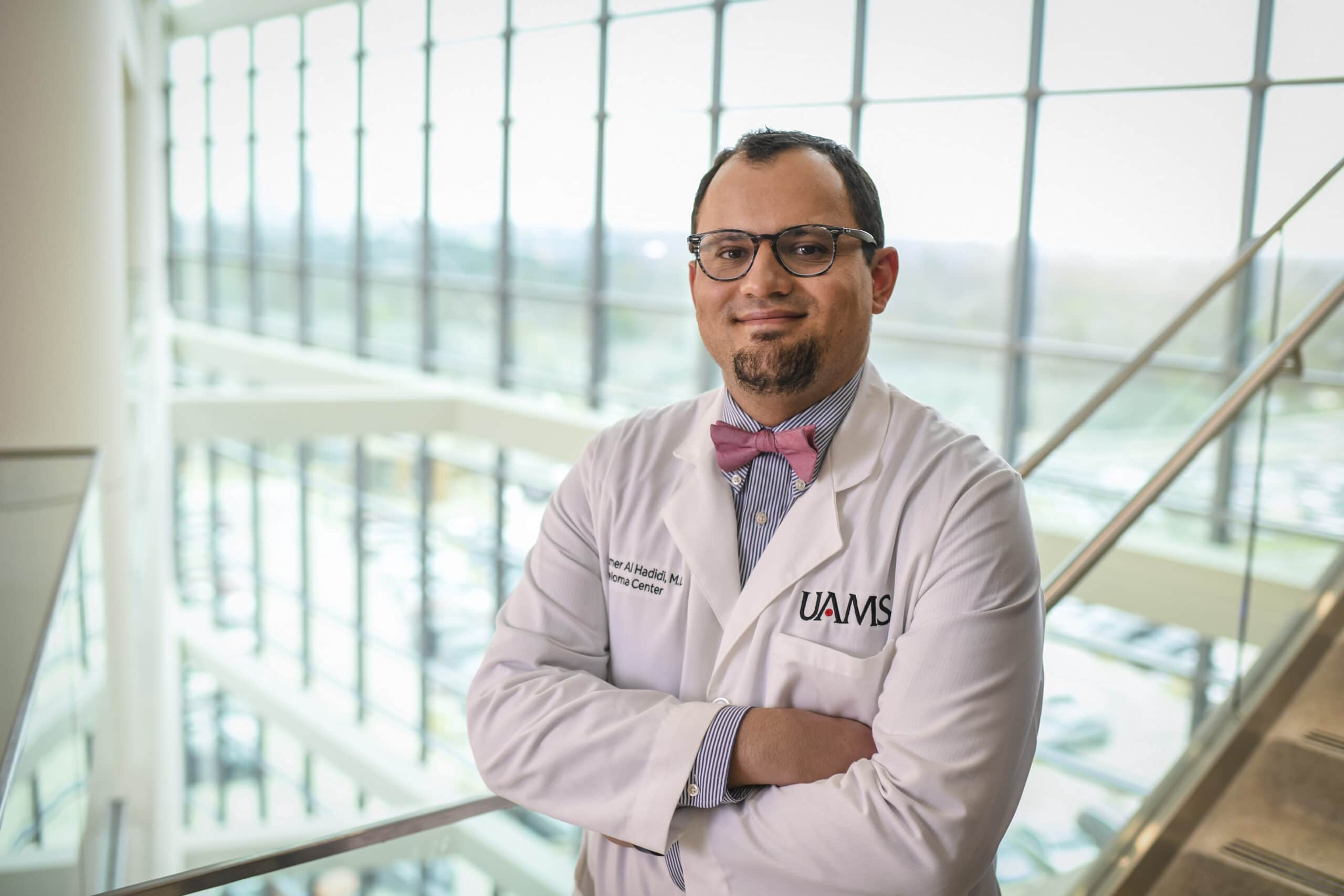View Larger Image

Samer Al Hadidi, M.D.
Image by Evan Lewis
Expanding the Field: Clinical Trials Diversity Benefits Myeloma Research
| Clinical trials have long been an established part of medical research. The University of Arkansas for Medical Sciences (UAMS) Myeloma Center and the Clinical Trials Office work together to create a more diverse pool of clinical trial participants in the continuing research of multiple myeloma.
Samer Al Hadidi, M.D., is a driving force in this effort.
“Eliminating disparities in multiple myeloma requires a multifaceted approach that addresses the social determinants of health, improves access to clinical trials and treatment services, and promotes health equity,” said Al Hadidi, who treats patients with myeloma and other plasma cell disorders.
The Myeloma Center focuses on determining factors leading to disparities in multiple myeloma and how to resolve them. UAMS researchers reported on underrepresentation of Black patients in pivotal clinical trials for chimeric antigen receptor (CAR) T-cell therapy, a promising cancer treatment.
The study, published on the JAMA Network Open, analyzed data from U.S. Food and Drug Administration (FDA) approval packages and found that only 5% of the participants were Black, despite the fact that Black individuals represent a significant proportion of the population affected by multiple myeloma.
“The underrepresentation of Black participants in clinical trials can lead to an incomplete understanding of the safety and efficacy of new treatments for this population,” Al Hadidi said.
The study highlights the need for improved efforts to increase the representation of Black individuals in clinical trials, particularly in pivotal trials that support FDA approval of new treatments.
UAMS has 260 active clinical studies overall across 12 types of cancer.
“Providing access to clinical trials begins by ensuring every eligible patient is given the opportunity to participate,” said Clinical Trials Office Director Matt Kovak, M.S.
“We have some of the foundational blocks in place, but we still have a lot of work to do,” said Assistant Director of Clinical Research Operations Susan Panozzo, B.S. “We are committed to the growth and expansion of clinical trial education and access to clinical trials for rural and underrepresented areas across Arkansas.”
Carolina Schinke, M.D., is heading a clinical trial for talquetamab, a bispecific antibody used in treating multiple myeloma. In this trial, 59% percent of those enrolled are Black patients.
“I was pleased to see our enrollment,” Al Hadidi said. “UAMS is the highest-enrolling site for the phase II portion of the trial.”
A current participant in the talquetamab trial, Rosalind Robinson exemplifies the need for diversity in these studies.
“I was first diagnosed with multiple myeloma about 10 years ago,” said Robinson, of Texarkana, Texas. “I was working overseas for the Army, and one day I passed out at my desk. When I came back home, I was seen at St. Michael in Texarkana. They referred me to UAMS.”
“In February 2022 Mrs. Robinson was facing a very challenging situation with progression of her multiple myeloma, with up to 50% plasma cells in the bone marrow,” said Sharmilan Thanendrarajan, M.D., who is currently treating her. “We were pleased to enroll her in the talquetamab trial, which led to an outstanding response. Mrs. Robinson is currently in stringent complete remission.”
JAMA Network Open published another study that investigated equitable geographic access to CAR T-cell clinical trials. The study was authored by Al Hadidi, UAMS Myeloma Center clinical director Frits van Rhee, M.D., Ph.D., UAMS researcher John Shaughnessy Jr., Ph.D., and UAMS physicians Schinke, Thanendrarajan, Guido J.K. Tricot, M.D, Ph.D.; Maurizio Zangari, M.D.; and Fenghuang (Frank) Zhan, M.D., Ph.D.
The researchers found 162 trials listed in ClinicalTrials.gov through Jan. 31, 2022. The study analyzed 69 trials with 7,896 participants who had enrolled or were expected to enroll. Following a cross-sectional analysis of the geographic distribution of the trials, only 35.9% of Black patients lived in a county with an open clinical trial for CAR T-cell therapy or bispecific antibodies.
The UAMS team concluded that the current distribution of clinical trials for CAR T-cell therapy or bispecific antibodies may contribute to disparities in access to new multiple myeloma therapies.
Al Hadidi, Schinke, Thanendrarajan, van Rhee and Zangari authored a separate study that concluded that substantial disparities affect Black patients with all approved CAR T-cell products.
Al Hadidi, a Healio Health Equity Award winner at the 2023 American Society of Clinical Oncology conference for his efforts in overcoming racial inequities in access to hematology and oncology care, offers steps which can be taken to eliminate these disparities.
“Improve access to health care services and clinical trials in underserved communities,” said Al Hadidi. “Address the root causes of health disparities, promote health literacy and education, and develop targeted interventions that address the unique needs of different populations.”
Robinson is grateful for her participation the UAMS trials as part of her treatment.
“The treatment is very good. I think it’s going well. I feel good.”
